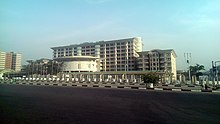 Headquarters of the ministry | |
| Agency overview | |
|---|---|
| Formed | September 1957 |
| Type | Cabinet-level executive department |
| Jurisdiction | Government of Nigeria |
| Headquarters | Tafawa Balewa House, Central Business District, Abuja |
| Minister responsible |
|
| Agency executive |
|
| Parent agency | Federal Executive Council |
| Child agency |
|
| Website | foreignaffairs.gov.ng |
The Ministry of Foreign Affairs of Nigeria is a statutory body created to reinforce foreign decision making and implementation processes in Nigeria [1] and handle the external promotion of Nigeria's domestic vision and ideals; it is headed by a federal executive cabinet minister. As of late its mission has geared towards increasing awareness about Nigeria's economic potential. It is part of the government's executive branch.
